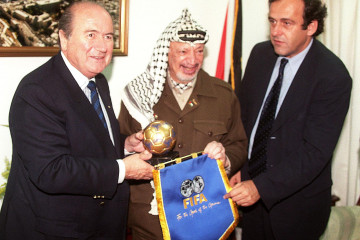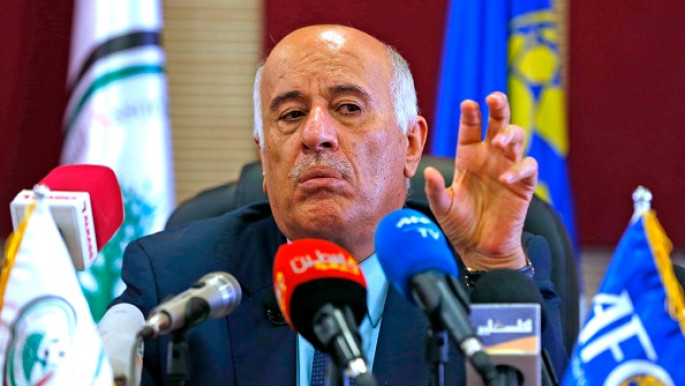
Sporting statehood: How Palestine became a FIFA member after decades of exclusion

With the first wave of Jewish emigration to Palestine at the end of the 19th century, the Zionist movement sought to use sport to bolster its project. They believed it could be effectively channelled as a way to prepare Jewish youths in Palestine for building the 'homeland'.
This was before the Balfour Declaration – which gave a huge boost to this project in 1917, with Britain promising to help the Zionist movement establish a Jewish homeland in Mandate Palestine.
In 1925, Jews in Palestine set up a body to organise and govern Jewish football clubs which had already started appearing.
Early on, it applied to join the Federation Internationale de Football Association (FIFA) but was unsuccessful; the organisation set up by the Maccabi World Union, didn’t represent both Arabs and Jews. This was the main reason given by FIFA for its refusal to admit it as a member.
In 1928, the first Palestinian Football Association was created. It included both Arab and Jewish players, with the inclusion of Arabs in order to meet FIFA's demand to represent the whole population in Palestine.
In 1929, the Palestinian Football Association joined FIFA. However, Jewish members were alone in charge of running the organisation, with the role of Arab members tokenised and marginalised.
"The Palestinian Arab Football Association temporarily disappeared after the Great Palestinian Revolt (1936-39), with many of its members arrested and imprisoned by the British mandate government for their involvement in the uprising"
In response, Palestinian Arabs founded the Palestinian Arab Football Association in 1931, which called for a boycott of Zionist teams in Palestine and organised Arab-only sports activities.
The Palestinian Arab Football Association temporarily disbanded after the Great Palestinian Revolt (1936-39), with many of its members arrested and imprisoned by the British Mandate government for their involvement in the uprising.
In the following years, many football clubs were established in Jerusalem, Jaffa, Haifa, Acca, Gaza, and Hebron. In 1944, the Palestine Arab Football Association was re-established and survived until the Nakba in 1948.
Meanwhile, the Zionist-dominated Palestine Football Association participated in the World Cup qualifiers in 1934 against Egypt and in 1938 against Greece. They used the name "Palestine" ("Mandatory Palestine") on both occasions. However, the team that played had no Arab players. Some of the Jewish footballers were soldiers serving in the British army.
|
|
First Palestinian attempt to enter FIFA
The first true Palestinian attempt to join FIFA took place in Luxembourg in 1946. FIFA refused, after a representative of the Jewish association argued that the "Palestinian Football Association" had been accepted previously, and was inclusive – containing four or five Arab clubs – although it contained a Jewish majority and archival documentation affirms the existence of over 50 Palestinian Arab football clubs in that period.
FIFA rejected a second membership request from the Arab Palestinian association, claiming that two associations from 'the same country' were not possible and that it would contradict its internal rules to accept part of a state as an independent member.
Despite that, Palestinian Arabs participated in pan-Arab tournaments, in Alexandria in 1952, Syria in 1956, and Lebanon in 1958. Some of the players taking part were believed to have been from the Palestinian diaspora, exiled after the Nakba.
"The first Palestinian attempt to join FIFA took place in Luxembourg in 1946. FIFA refused, after a representative of the Jewish association argued that the "Palestinian Football Association" had been accepted previously, and was inclusive - containing four or five Arab clubs"
After the West Bank was annexed by Jordan, some Palestinian teams participated in the Jordanian league, like the Shabab al-Khalil (Hebron Youth), and the Jerusalem Muazpheen Club.
The Six-Day War
Palestinian football came to a halt once more when Israel seized and occupied the West Bank and Gaza in 1967. The Palestinian Arab Football Association was re-established outside of Palestine in 1971. Gradually, some football clubs started becoming active again in the occupied territories, in and around Jerusalem, Nablus, Jericho, Hebron and Gaza. Meetings were set up to organise sports activities and games.
Palestinian clubs played multiple matches against each other at stadiums that existed in that period, such as the St George's School stadium in Jerusalem, Hussein Bin Ali Stadium in Hebron, Yarmouk Stadium in Gaza, and Al-Baladi in Jericho.
In 1980, a Palestinian Clubs League was established in the West Bank, alongside another in Gaza. The two leagues oversaw many tournaments before the First Intifada broke out in 1987, and sports activities stopped completely, as football clubs became strongholds of resistance.
Among the thousands killed, prisoners, and wounded, many were footballers and athletes, who played a prominent role in the Intifada.
A Palestinian diaspora squad was set up abroad, with footballers from the Palestinian diaspora in Iraq, Syria and Kuwait. The team took part in a sports tour, travelling to France, Italy, and Spain, where football matches were arranged with friends of the Palestinian people.
Four years later, in 1991, footballing resumed in stadiums in the West Bank and Gaza, and a People's Neighbourhood Championship was organised. This situation lasted until 1993's Oslo Accords and saw around 350 active clubs across the West Bank and the Gaza Strip. In November 1993 the Palestinian (Arab) Football Association asked FIFA to accept its membership bid, in line with the recognition of the Palestinian Olympic Committee by the International Olympic Committee that year.
In 1994, with the start of the Palestinian National Authority (PA) era, a Ministry of Youth and Sports was established, headed by Dr Azmi Shu'aibi. The Ministry cooperated with the Olympic Committee to establish sporting associations, including the Football Association. In September 1995 the Palestinian Football Association was finally granted provisional member status by FIFA, a decision ratified in Zurich in July 1996.
"Football clubs became strongholds of resistance, with athletes dedicating their skills to the Palestinian cause. Among the thousands killed, prisoners, and wounded, were many footballers and athletes, who played a prominent role in the Intifada"
On 8 June 1998, during the 51st FIFA conference in Paris, Palestine was accepted as a full member of FIFA. The late prince Faisal bin Fahd Al Saud, former president of Youth Welfare in Saudi Arabia played a decisive role in Palestine's entry into the FIFA family.
He had met repeatedly with Joao Havelange, FIFA's then-president to press for Palestine's inclusion. He also offered his financial and moral support to Palestinian football and this support outlived him, being reflected later on by Saudi support for Palestine within FIFA, and through funding the construction of the Faisal Al-Husseini International Stadium in the Al-Ram suburb of Jerusalem.
Despite Palestine not qualifying for #WorldCup2022, its national flag has been spotted both inside and outside the stadium across Qatar. @saoudkhalaf_ delves into the nature of this support 👇 https://t.co/pq0DQuiQpX
— The New Arab (@The_NewArab) December 5, 2022
George Ghattas, who was deputy president of the Palestinian (Arab) Football Association at the time, recalls that "a surge of emotion overcame the Palestinian delegation, amidst thundering applause from the delegates of national associations from all over the world", when the vote was cast unanimously by the representatives of every country, including the Israeli representative (who initially opposed the motion but found himself outnumbered and ended up voting with it).
Palestine won the bronze medal at the 9th Arab Games in Amman in 1999, and over the last decade, Palestine has participated in the AFC Asian Cup finals on a number of occasions. Some international actors have tried to organise football matches between the Palestinian and Israeli teams – an attempt at sports normalisation – however, the Palestinian side has always rejected these attempts.
This is an edited translation from our Arabic edition. To read the original article click here.
Article by Badr Taleb Makki: Sports editor for the al-Sha'b newspaper in Jerusalem from 1986 to 1993 and Secretary of the Hilal Al-Quds Club from 1990-2007. Media director for the Ministry of Youth and Sports from 1994 to 2014. Media spokesman and Secretary of the Palestinian Football Association from 1996 to 2007. Media director for the Palestinian Olympic Committee from 2015-2018.
Translated by Rose Chacko
This article is taken from our Arabic sister publication, Al-Araby Al Jadeed and mirrors the source's original editorial guidelines and reporting policies. Any requests for correction or comment will be forwarded to the original authors and editors.
Have questions or comments? Email us at: info@alaraby.co.uk

![sudan women [getty] sudan women [getty]](/sites/default/files/styles/image_330x185/public/media/images/5019D7F4-52AF-4377-8A05-885D27476479.jpg?h=d1cb525d&itok=tKXV7r-W)
